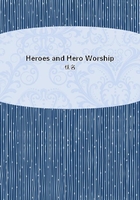
第29章
We will not praise Mahomet's moral precepts as always of the superfinest sort; yet it can be said that there is always a tendency to good in them;that they are the true dictates of a heart aiming towards what is just and true. The sublime forgiveness of Christianity, turning of the other cheek when the one has been smitten, is not here: you _are_ to revenge yourself, but it is to be in measure, not overmuch, or beyond justice. On the other hand, Islam, like any great Faith, and insight into the essence of man, is a perfect equalizer of men: the soul of one believer outweighs all earthly kingships; all men, according to Islam too, are equal. Mahomet insists not on the propriety of giving alms, but on the necessity of it: he marks down by law how much you are to give, and it is at your peril if you neglect.
The tenth part of a man's annual income, whatever that may be, is the _property_ of the poor, of those that are afflicted and need help. Good all this: the natural voice of humanity, of pity and equity dwelling in the heart of this wild Son of Nature speaks _so_.
Mahomet's Paradise is sensual, his Hell sensual: true; in the one and the other there is enough that shocks all spiritual feeling in us. But we are to recollect that the Arabs already had it so; that Mahomet, in whatever he changed of it, softened and diminished all this. The worst sensualities, too, are the work of doctors, followers of his, not his work. In the Koran there is really very little said about the joys of Paradise; they are intimated rather than insisted on. Nor is it forgotten that the highest joys even there shall be spiritual; the pure Presence of the Highest, this shall infinitely transcend all other joys. He says, "Your salutation shall be, Peace." _Salam_, Have Peace!--the thing that all rational souls long for, and seek, vainly here below, as the one blessing. "Ye shall sit on seats, facing one another: all grudges shall be taken away out of your hearts." All grudges! Ye shall love one another freely; for each of you, in the eyes of his brothers, there will be Heaven enough!
In reference to this of the sensual Paradise and Mahomet's sensuality, the sorest chapter of all for us, there were many things to be said; which it is not convenient to enter upon here. Two remarks only I shall make, and therewith leave it to your candor. The first is furnished me by Goethe; it is a casual hint of his which seems well worth taking note of. In one of his Delineations, in _Meister's Travels_ it is, the hero comes upon a Society of men with very strange ways, one of which was this: "We require," says the Master, "that each of our people shall restrict himself in one direction," shall go right against his desire in one matter, and _make_ himself do the thing he does not wish, "should we allow him the greater latitude on all other sides." There seems to me a great justness in this. Enjoying things which are pleasant; that is not the evil: it is the reducing of our moral self to slavery by them that is. Let a man assert withal that he is king over his habitudes; that he could and would shake them off, on cause shown: this is an excellent law. The Month Ramadhan for the Moslem, much in Mahomet's Religion, much in his own Life, bears in that direction; if not by forethought, or clear purpose of moral improvement on his part, then by a certain healthy manful instinct, which is as good.
But there is another thing to be said about the Mahometan Heaven and Hell.
This namely, that, however gross and material they may be, they are an emblem of an everlasting truth, not always so well remembered elsewhere.